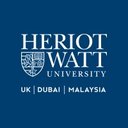Heriot-Watt University
Post-Doctoral Research Associate in Computational Imaging
Job Description
Directorate: School of Engineering & Physical Sciences
Salary: Grade 7 (£36,023-£45,585)
Contract Type: Full Time (1FTE), Fixed Term (8 Months)
Rewards and Benefits: 33 days annual leave, plus 9 buildings closed days for all full time staff (Part time workers should pro rata this by their FTE). Use our total rewards calculator: https://www.hw.ac.uk/about/work/total-rewards-calculator.htm to see the value of benefits provided by Heriot-Watt University
Detailed Description
This project will investigate the implementation of spiking neural networks (SNNS) on traditional computational platforms and dedicated neuromorphic hardware for accelerating computer vision tasks.
The development of neuromorphic hardware has recently enabled the implementation of fast computational methods for extracting information for sensor data. While originally designed to handle data encoded via temporal series of spikes or events, neuromorphic hardware can now be used to extract information from images or videos at very high-speed, potentially competing with state-of-the-art architectures leveraging GPU processing power.
In this project, we will:
- Compare state-of-the-art object detection algorithms implemented on standard computing platforms as well as neuromorphic accelerators.
- Use detection results to drive a moving platform and track a moving object of interest
- Use data from a Lidar camera to recognise and image moving objects.
The methods presented above will primarily be used to extract information from frame-based cameras, but also from event-cameras.
Key Duties and Responsibilities
The post holder is required to
- Develop suitable algorithmic methods live and real-time analysis of event-based data.
- Write research reports and publications. Analyse and interpret the results of own research and generate original ideas bases on outcomes. Prepare proposals and applications to external bodies, e.g. for funding purposes. Use initiative and creativity to identify areas for research, develop new research methods and extend the research portfolio.
- Build internal contacts and participate in internal networks for the exchange of information and to form relationships for future collaboration. Work with academic colleagues on areas of shared research interest and contribute to collaborative decision making. Join external networks to share information and identify potential sources of funds.
- Provide guidance as required to support staff, research students and any other students who may be assisting with the research.
- Contribute, under supervision, to the planning of research projects, including the development of new grant/contract proposals. Make internal and external contacts to develop knowledge and understanding and form relationships for future collaboration.
- General tasks will involve scientific research; analysis and interpretation of data; communication with other investigators involved in this collaborative project; preparation of scientific papers.
- The successful candidate will be expected to conduct and lead their own experiments whilst also supervising the activities of junior group members and PhD students.
- Responsibilities will also include assistance in the day-to-day maintenance of the experimental facilities, liaising with companies and external collaborators.
- The successful candidate is also expected to be involved in our outreach activities, with roles that can be tuned to the specific preferences of the candidate but will involve for example interviews, talks for the general public and preparation of experimental demonstrators.
Please note that this job description is not exhaustive, and the role holder may be required to undertake other relevant duties commensurate with the grading of the post and its general responsibilities. Activities may be subject to amendment over time as the role develops and/or priorities and requirements evolve.
Education, Qualifications & Experience
Essential
- Possess and maintain sufficient breadth or depth of specialist discipline knowledge and or research methods and techniques to work in own area.
- A record of high quality publications, and evidence of contribution to the writing of these publications proportionate to opportunity.
- Experience with Python and C++ applied to research in a relevant discipline.
- Ability to articulate research work, both in technical reports / papers and by oral presentation
- Ability to formulate and progress work on their own initiative
Desirable
- Evidence of ability to present work effectively in person, e.g. at conferences and seminars.
- Experience in leading the writing of scientific papers.
- Evidence of ability, subject to opportunity, to guide other researchers, e.g. PhD students and undergraduate project students.
- Capability to be self-directed and think innovatively.
- Energy and enthusiasm for the project.
About our Team
The School of Engineering & Physical Sciences has an international research reputation and close connection with the professional and industrial world of science, engineering and technology. Our research ranges from fundamental sciences through to engineering applications, all of which are supported by strong external funding. We have around 150 full-time academic staff who drive this research activity and are based in 5 research institutes: the Institute of Chemical Sciences, the Institute of Photonics & Quantum Sciences, the Institute of Mechanical, Process & Energy Engineering, the Institute of Sensors, Signals & Systems and the Institute of Biological Chemistry, BioPhysics & BioEngineering. REF2014 named Heriot-Watt in the top 25% of UK universities, with 82% of our research ranked as world-leading or internationally excellent. Heriot-Watt ranked 9th university in the UK and 1st in Scotland for research impact.
The School of Engineering & Physical Sciences has received the Bronze Award from the Athena SWAN Charter recognising excellence in championing employment of women in the fields of science and technology, engineering and mathematics.
In addition we deliver teaching across 6 undergraduate and post-graduate programmes: Chemistry; Physics; Electrical, Electronic & Computer Engineering; Chemical Engineering; Mechanical Engineering and Brewing & Distilling. 90% of our students were satisfied overall with their course in over half of the University’s subject areas. At subject area level the School ranked in the top 10 UK universities for Physics and we were 3rd in Scotland for Chemistry and 2nd for Mechanical Engineering and 1st in Scotland for Chemical Engineering.
The Institute of Signals, Sensors and Systems (ISSS) is one of five Research Institutes forming the research infrastructure of the School of Engineering & Physical Sciences (EPS). With 40 academic members of staff spanning 10 nationalities and 4 fields of expertise, ISSS aims to offer the full portfolio of expertise in the fields of signal and image processing, novel manufacturing technologies, microsystems, microwave engineering, mobile communications systems and autonomous systems. Of particular interest to ISSS is the design, modelling, simulation, processing of information from and system integration of sensors. The Signal and Image Processing Laboratory (SIPLab) at Heriot-Watt specializes in the design of advanced data science techniques with applications ranging from robotics to imaging and communication, in a large variety of fields including defence, astronomy, art investigation, or medicine. Our research activities range from signal and image processing theory to application, and impact different areas of society. SIPLab is active in both traditional and emerging areas, and currently covers the following topics:
Signal and image processing theory
Statistical signal processing, non-stationary processes, Bayesian inference, signal models, sampling theory, sensing techniques, optimisation theory and algorithms, multi-modal data processing, high-performance computing, mathematical image analysis, geometric modelling, acoustic signal propagation, Monte Carlo simulation methods, decision theory, uncertainty quantification, machine learning.
Applications and areas of key innovation
Image analysis, computer graphics, autonomous and assisted driving, 3D scene analysis, Lidar.
About Heriot-Watt
Heriot-Watt University has established a reputation for world-class teaching and leading-edge, relevant research, which has made it one of the top UK universities for innovation, business and industry.
Heriot-Watt University has five campuses: three in the UK (Edinburgh, Scottish Borders and Orkney), one in Dubai and one in Malaysia. The University offers a highly distinctive range of degree programmes in the specialist areas of science, engineering, design, business and languages. Heriot-Watt University is also Scotland’s most international university, boasting the largest international student cohort.
How to Apply
Please submit via the Heriot-Watt on-line recruitment system (1) Cover letter describing their interest and suitability for the post; (2) Full CV
Applications can be submitted until midnight on Monday 15th April 2024.
At Heriot Watt we are passionate about our values and look to them to connect our people globally and to help us collaborate and celebrate our success through working together. Our research programmes can deliver real world impact which is achieved through the diversity of our international community and the recognition of creative talent that connects our global team.
Our flourishing community will give you the freedom to challenge and to bring your enterprising mind and to help our partners with solutions that can be applied now and in the future. Join us and Heriot Watt will provide you with a platform to thrive and work in a way that also helps you live your life in balance with well-being and inclusiveness at the heart of our global community.
Heriot-Watt University is committed to securing equality of opportunity in employment and to the creation of an environment in which individuals are selected, trained, promoted, appraised and otherwise treated on the sole basis of their relevant merits and abilities. Equality and diversity are all about maximising potential and creating a culture of inclusion for all.
Heriot-Watt University values diversity across our University community and welcomes applications from all sectors of society, particularly from underrepresented groups. For more information, please see our website https://www.hw.ac.uk/uk/services/equality-diversity.htm and also our award-winning work in Disability Inclusive Science Careers https://disc.hw.ac.uk/ .
We welcome and will consider flexible working patterns e.g. part-time working and job share options.
Use our total rewards calculator: https://www.hw.ac.uk/about/work/total-rewards-calculator.htm to see the value of benefits provided by Heriot-Watt University.

